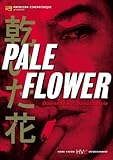Eye For Film >> Movies >> Pale Flower (1964) Film Review
Mid-ranking yakuza Muraki (Ryo Ikebe) has just been released from a prison stint for murder, and as he looks over the streets of Tokyo for the first time in three years, he muses in voice-over about how nothing ever really changes and how people are little more than half-dead, stupid animals, before stopping at a lurid poster for a vampire movie. "This is my territory," he says. "With no second thoughts I'm back again."
Saeko (Mariko Kaga), a well-groomed young woman slumming it in the criminal underworld, is also something of a vampire - "I've no use for the dawn, I adore these evil nights", she tells Muraki - and so it seems fated that these two creatures of darkness should be drawn to one another. Both are jaded, reckless, misanthropic nihilists who try to stave off their worldweariness with the momentary excitement of high-stakes gambling, high-speed joyrides, and other meaningless sensations. Yet when Saeko begins to drift towards the murderous junkie Yoh (Takashi Fujiki), Muraki bids to lure her back by inviting her to watch his next mob hit, knowing it is the kind of flirtation that she is unable to resist.
From race courses to gambling dens, from cabaret nightclubs to syndicate headquarters, Masahiro Shinoda's Pale Flower (aka Kawaita Hana) offers a grittily realistic portrait of yakuza life in all its banality - but that is not its prime concern. It shows the machinations of two Tokyo gangs, recently at war but now in a fragile alliance to see off the unwelcome encroachments of a third group from Osaka – but that is not really what the film is about. It examines the activities of the organised criminal class with a remarkable lack of moral judgment – but that, too, is just in the background. It offers a range of eccentric character sketches, including a yakuza chief (Seiji Miyaguchi) obsessed with dental work – yet that is not its point either.
No, Pale Flower is about the doom-laden tick tick tick of time, the conflict of fate and chaos, the inevitability of death and, most importantly, the disorienting anomie of post-war Japan – all wrapped up in a slow-dancing relationship between a man and a woman whose interest in each other is both less and more than erotic. Outwardly Muraki seems every bit the team player, always dependable when it comes to stepping up and taking action, but in fact he places little value in the yakuza code, or notions of obligation and face, instead taking risks, busting heads and committing cold-blooded murder merely because they are the only things that make him feel alive in a world that otherwise leaves him cold. Saeko, though from an entirely different class and much younger, shares Muraki's sense of detached ennui, and seems for a while his natural partner in crimes of dispassion.
The couple's amoral path reflects a Japan whose the traditional cornerstones of patriarchal rule, obedience and honour had been shaken to their foundations by war-time defeat and post-war occupation. There is simply nothing, present or future, for these childless, living dead characters to believe in, and if the elder generation - here embodied by the allied yakuza chiefs Funada and Yasuoka (Seiji Miyaguchi, Eijiro Tono) - are still pulling the strings, nonetheless the wild dog Muraki, the thrill-seeking Saeko and the addicted Yoh seem to be playing by their own self-destructive rules. Rarely has the vacuum of values left by dramatic social upheaval been captured with such subtlety.
The yakuza drama is as old as Japanese cinema itself, but it was Shinoda's innovation to merge the genre with the black-and-white expressionism – and stark existential themes – of western film noir. Shot in stunning monochrome Cinemascope, Pale Flower plays itself out amidst moodily stylised shadows and angular sets, so that there is little to distinguish Maruki's underworld reality from his angst-ridden nightmares (as realised in one memorable sequence). And to match its exquisitely dark visuals, the film has a soundtrack of clattering percussion and discordant brass glissandi by the great Toru Takemitsu. All in all, it is a lost classic, part Bob Le Flambeur (1955), part Rebel Without a Cause (1955), but with an ecstatic blankness all its own.
Reviewed on: 01 Nov 2006




















